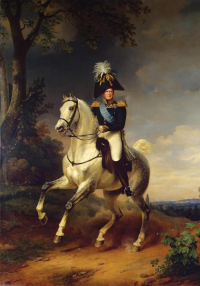The Roots of Globalism
AT A GLANCE
• The Holy Alliance is revered by globalists as the starting point of modern multilateralism.
• The vision of global governance is now advancing under the United Nations.
• Globalism has long dissociated itself from Christianity.
• The League of Nations was the first real attempt to set up a global multinational organization.
One evening in early 1815, shortly after the exile of Napoleon Bonaparte to the island of Elba, a strange and secret meeting took place in the German city of Heilbronn. It was here that Russia’s youthful czar, Alexander I, had gone during a lull in negotiations at the Congress of Vienna. Alexander, hailed as the liberator of Europe for his successful conquest of Paris and defeat of Napoleon, was frustrated with the serpentine diplomacy and backroom dealing at Vienna, where the powers of the Continent were trying to plan for the future of post-Napoleonic Europe. The favorite grandson and chosen heir of Catherine the Great, Alexander was notable for his exceptional education and religious fervor, which had begun to verge into mysticism. Like many monarchs before him, he appears to have suffered acute pangs of guilt for the things he had done as the Russian Empire’s paramount leader.
But as emperors go, Czar Alexander was exceptionally benign. Alone among the allies at Vienna, he insisted on magnanimity toward the defeated French. Like most Russian nobility of his age, Alexander was as versed in the French language and culture as he was in his own, and wanted post-Napoleonic France to survive as a great power, instead of being dismembered and humiliated by the victors. Not many years earlier, Alexander and the Russian army had suffered massive losses at Austerlitz, with the czar himself nearly being killed. After that pivotal battle, the victorious French had pressed their advantage, launching their calamitous invasion of Russian territory that inflicted immense suffering on the Russian people, and were only in the end turned back by “Generals January and February.”

In spite of all this, Alexander I, in the transports of religious piety that invited the ridicule of more worldly participants in the Vienna Congress such as Austria’s Foreign Minister Klemens von Metternich and England’s Viscount Castlereagh, sought a charitable and Christian outcome for the ruinous war. Something of a naïve dilettante at heart, Alexander appears to have been genuinely perplexed by his inability to persuade the other conferees to adopt his mystical Christian vision of Europe’s future. His perplexity continued until one fateful night, when a strange visitor presented herself at the doors of his temporary residence in Heilbronn, hammering insistently at the door and forcefully demanding an audience with the czar.
JBS Member?
Sign in with your ShopJBS.org account.
 Subscribe Now
Subscribe Now
- 12 Issues Per Year
- Digital Edition Access
- Digital Insider Report
- Exclusive Subscriber Content
- Audio provided for all articles
- Unlimited access to past issues
- Cancel anytime.
- Renews automatically
 Subscribe Now
Subscribe Now
- 12 Issues Per Year
- Print edition delivery (USA)
*Available Outside USA - Digital Edition Access
- Digital Insider Report
- Exclusive Subscriber Content
- Audio provided for all articles
- Unlimited access to past issues
- Cancel anytime.
- Renews automatically

